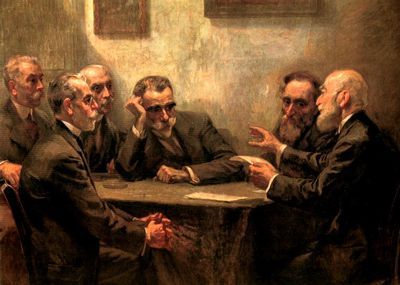Log-rolling for beginners

Parnassos Literary Society by Georgios Roilos
By MICHAEL CAINES
Of course, some say, it's unavoidable: the world of, say, Liminal Gnocchi studies is small, and when one of the grands fromages of LG studs publishes a major work of scholarship, it's impossible to find a reviewer who doesn't already know Professor Al Dente personally. Indeed, your reviewer is in Dente's "acknowledgements", listed as "a close personal friend whom I've known for years, and whose comments on the manuscript to this book have proved invaluable". But never mind ��� a review's a review.
The Gnocchi scenario aside, however, I doubt that all readers are aware how shamelessly, craftily and unrelentingly writers seek to review one another. I wouldn't say it's a daily or even a weekly event that I receive such a request, typically from a reviewer new to me. It happens often enough, though, that I receive an e-mail along these lines: do I need somebody to cover so-and-so's excellent new book? It's not published until October, but the would-be critic happens to have read it in draft. . . .
In other words, don't be surprised that friends wish to help friends, albeit in this small way ��� that's what friends do, right? But perhaps I'm allowed to raise an eyebrow, even after taking years trying to reconcile myself to the phenomenon, that friends do it so flagrantly.
Sometimes such proposals arise from naivety. There's a young chap gadding around other people's book pages, I know, who first asked me if he could review a novel he'd seen in manuscript, exactly as described above. More recently, we were approached by a biographer who wanted to do his fellow biographer a good turn, absolutely untroubled by the fact that he's never strayed into her historical period before ��� and also that they were well known to be thieving-thick.
Mere gossip, you'll say, unhelpfully shorn of the proper names. A couple of exceptional cases. It's also ��� to revisit the Gnocchi scenario for a moment ��� a different matter when you know that somebody serious-minded and at work in the same field wants to re-engage with the latest production of a contemporary. Even the timorous editor can then feel that they might just be furthering some worthwhile intellectual dialogue.
(An extreme example: there was a spat in the letters page among historians of Madagascar a few years ago; but as one of the correspondents claimed, "there are only three of us", condemned to spend their careers reviewing one another.)
When the subject came up recently in conversation at TLS HQ, however, it turned out everybody present could name more than one instance of sheer unabashed log-rolling; and it's the unabashed tone that particularly intrigues me. The academic who offered to review a book by his sometimes co-author; the well-meaning enthusiast who wanted to review the latest collection of stories by a Danish author, after (he declared with understandable pride) spending a few days with her and, yes, reading the manuscript in advance.
Is this in part an academics' attitude problem (career advancement hinging on such alliances) or is it more the fault of the books pages fostering the impression that disinterested opinion is worth less to them than enthusiastic back-scratching? When confronted with certain my-back-your-back instances of poetry reviewing, for example, you might well think so. In the course of that recent chat, somebody recalled a review of an essay collection, in which singled out for praise was a contribution that turned out to be by the reviewer's wife.
It's sometimes said that what the book reviewers say doesn't matter much in commercial terms. If that's the case, it certainly doesn't stop some authors from caring deeply about who gets to say what about them in print. I suppose it partly depends how puritanically you regard reviewing as a critical activity set apart from (apart from, and maybe below, please note, but most certainly not above) the book industry as a whole. Crossing the line isn't necessarily a bad thing, at least in the longer term: it's still of interest, I would guess, to Inklings aficionados, to know what C. S. Lewis could get away with saying about J. R. R. Tolkien (anonymously) in 1937 ��� or for anybody to take heart from Walter Scott's harsh review of his own work and Anthony Burgess's account of Inside Mr Enderby by "Joseph Kell". "This is, in many ways, a dirty book", Burgess wrote of what was, in fact, a work of his own. "The book itself is a laughing-stock. And yet how thin and under-savoury everything seems after Enderby's gross richness."
If anybody's managed to get away with that one recently, I'd love to know. In the meantime, it's one reason for us to go on, as we generally do, commissioning reviews after seeing the books for ourselves rather than, as some papers nonchalantly do, trusting to taking reviews on spec.
Peter Stothard's Blog
- Peter Stothard's profile
- 30 followers



